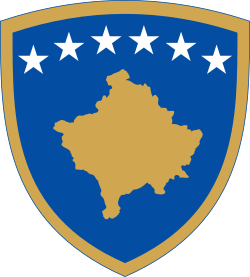Klokot
Klokot (Serbian Cyrillic: Клокот) or Kllokot (Albanian: Kllokoti), is a town and municipality in the District of Gjilan in southeastern Kosovo.[lower-alpha 1] The municipality was established on 8 January 2010, the settlements having been part of the municipality of Vitina. The seat of the municipality is in the town of Klokot. It is a Serbian enclave, and planned member of the Community of Serb Municipalities.
Klokot | |
|---|---|
Town and municipality | |
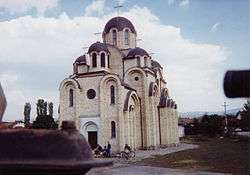 Orthodox Church in Klokot | |
 Emblem | |
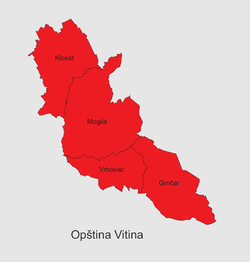 Klokot municipality | |
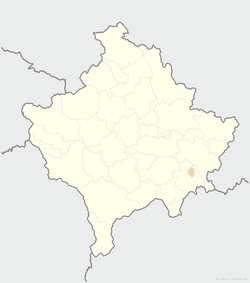 Location in Kosovo | |
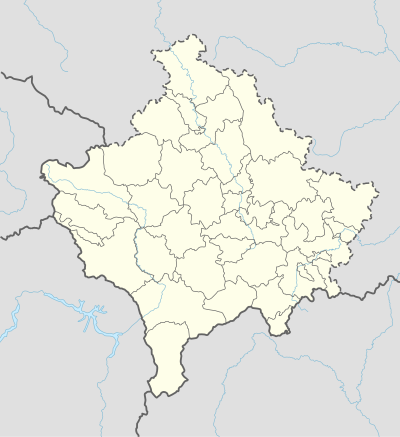 Klokot Location in Kosovo | |
| Coordinates: 42°22′N 21°23′E | |
| Country | Kosovo[lower-alpha 1] |
| District | District of Gjilan |
| Municipality | 8 January 2010[1] |
| Seat | Klokot |
| Government | |
| • Mayor | Božidar Dejanović (SL) |
| Area | |
| • Total | 23.36 km2 (9.02 sq mi) |
| Population (2011) | |
| • Total | 2,556 |
| • Density | 88.9/km2 (230/sq mi) |
| Website | kk |
Geography
Klokot is situated in the geographical region of Kosovo Pomoravlje, in the southeastern part of Kosovo.
The municipality has a cadastral area of 2,336 hectares (5,770 acres). The municipality includes the town of Klokot and three villages:[1]
History
On 16 August 1999, after the Kosovo War, a mortar attack carried out by Albanians killed two Serb civilians in the village. There had earlier that month been two mortar attacks.[2]
In August 2003, explosive devices planted in Klokot destroyed five Serb houses, with several injuries, including two American KFOR soldiers.[3]
The municipality of Klokot was officially established on 8 January 2010, previously being part of the Vitina Municipality.[1] The seat of the municipality is in Klokot. This and other new-formed municipalities of Kosovo are not recognized by Serbian government, which still considers it part of Vitina municipality.[4] The municipality was formed based on the Ahtisaari plan for decentralization of Kosovo which called for the establishment of a municipality with Serbian majority within the Vitina municipality.
Between 2014 and March 2016, 30 Serb families with 124 members have left the municipality.[5] In December 2016, two local Serb youngsters were stabbed by a group of six Albanians. The week before, a house of a Serb returnee family had been burnt down.[6]
For 2016, the estimated budget for the municipality was €800,000.[7]
The municipality is planned to be included in the Community of Serb Municipalities, according to the Brussels Agreement (2013).
Economy
The economy of the municipality of is mainly based on natural resources (mostly mineral water), tourism (two private spas), agriculture and small trade businesses. Klokot has some important hot-water springs that get up to 32 °C (90 °F).[8] There are 29 registered private businesses operating in the municipality.[1]
Public services
There are three elementary schools in the municipality with 599 students and 33 teachers, one secondary school with 147 students and 13 teachers and one kindergarten with 15 children and 2 teachers (As of 2013).[1] Two elementary schools follow Serbian curricula, while one follows Kosovo curricula.[1] The St. Sava Elementary school in Klokot is attended by 250 students (As of 2001) and the secondary school is located in Vrbovac.[9]
Culture
The municipality has four Serbian Orthodox churches. The church in Grnčar was mined and destroyed by the Albanians during the Kosovo conflict, and was later fully reconstructed.[1] There is a mosque in village of Mogila which was not damaged during the conflict.
- Spa Center in Klokot
 Houses in Klokot
Houses in Klokot KFOR soldiers in Klokot in 1999
KFOR soldiers in Klokot in 1999
Politics
The first (and most recent to day) municipal elections were held on 15 November 2009.[10] Although Serbian Government did not recognize those elections, 25,4% of local voters, mostly Serbs, did participate in the elections.[11] Serb Saša Mirković was elected mayor.[1][12] Out of 15 members of the municipal assembly, ten were elected from the Serb Independent Liberal Party, and five from the Albanian Democratic League of Kosovo.[1][13] In November 2017, Božidar Dejanović of the Serb List became the new mayor of Klokot.[14]
Demographics
The municipality of Klokot has a Serb majority and Albanian minority.[15] The ECMI calculated, based on 2010 and 2013 estimations, that the Klokot municipality was inhabited by 3,500 Serbs (71.23%).[16] The town of Klokot had 1,500 residents before the Kosovo War (1998–99), and 1,200 in 2001.
According to the 2011 census, which is unreliable due to partial boycot by Serbs and other minorities,[17] the town of Klokot alone had 1,064 residents, 616 Serbs (57.89%), 446 Albanians (41.91%), and 2 others; the municipality had 2,556 residents, 1,362 Albanians (53.29%), 1,177 Serbs (40.05%), 9 Romani (0.35%), 1 Turk (0.04%) and 7 Others and unspecified (0.27%). The number of residents before the Kosovo War was estimated to have been 5,000 in what is today the Klokot municipality.[1]
Annotations
- Kosovo is the subject of a territorial dispute between the Republic of Kosovo and the Republic of Serbia. The Republic of Kosovo unilaterally declared independence on 17 February 2008, but Serbia continues to claim it as part of its own sovereign territory. The two governments began to normalise relations in 2013, as part of the 2013 Brussels Agreement. Kosovo is currently recognized as an independent state by 97 out of the 193 United Nations member states. In total, 112 UN member states recognized Kosovo at some point, of which 15 later withdrew their recognition.
See also
- Municipalities of Kosovo
- Cities and towns in Kosovo
- List of populated places in Kosovo
References
- MUNICIPAL PROFILES: Klokot/Kllokot (January 2013), from the OSCE Mission in Kosovo official site, accessed 6 October 2013.
- NY Times. 18 August 1999 https://www.nytimes.com/1999/08/18/world/shelling-of-a-serbian-village-in-kosovo-kills-2.html. Missing or empty
|title=(help) - Serbian Studies. 18. North American Society for Serbian Studies. 2004. p. 315.
- Law on Territorial Organization of the Republic of Serbia Archived 2013-10-12 at the Wayback Machine (in Serbian), adopted on 29 December 2007, from the official web site of the Parliament of Serbia , accessed on 6 October 2013.
- "Opštinu Klokot Vrbovac napustilo 30 srpskih porodica".
- "SRBI META ŠESTORICE ALBANACA "Napali su nas iz čista mira"". Blic.
- "Srbi u Pomoravlju bez perspektive". TV Most.
- ASIN 3897941414
- "We Are Imprisoned Here Like on Reservation". Blic. 13 January 2001. Retrieved 12 March 2012.
- KIM radio: Sve spremno za izbore u opštini Klokot-Vrbovac (27.10.2009) (in Serbian)
- KIPRED: Decentralization in Kosovo I: Municipal elections and the Serb participation Archived 2011-07-19 at the Wayback Machine
- KIM radio: Održana druga sednica decentralizovane opštine Klokot (02 Feb 2010) (in Serbian)
- KIM radio: Decentralizovana opština Klokot održala prvu sednicu Skupštine (21 Jan 2010) (in Serbian)
- "Božidar Dejanović ..." Blic.
- Instituti GAP.
- ECMI Kosovo 2013.
- "ECMI: Minority figures in Kosovo census to be used with reservations". ECMI. Archived from the original on 2017-05-28. Retrieved 2015-04-16.
Sources
- "Opština Klokot" (PDF). Instituti GAP.
- "Community Profile: Serb Community" (PDF). ECMI Kosovo. 2013. Cite journal requires
|journal=(help)
External links
| Wikimedia Commons has media related to Klokot. |
